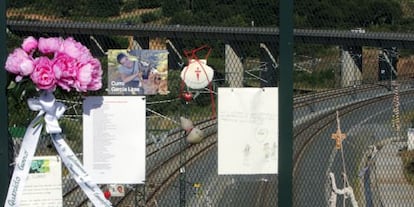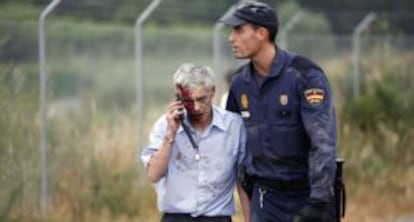Alvia crash inquiry stalls two years after Spain’s deadliest train accident
Victims' associations demand that Adif railway maintenance officials be put on trial

Two years after the deadly Alvia high-speed train crash that killed 79 people near Santiago de Compostela, survivors and victims' families continue to demand that officials at the state-owned rail company Adif be charged with criminal negligence for having lax safety measures.
So far, prosecutors have only held the train driver, Francisco José Garzón, criminally responsible for the tragic accident that also left more than 150 people injured on July 24, 2013.
Victims groups fear that no one else, except the driver, will ever be brought to justice
Adif – the state entity that manages railway infrastructure in Spain – and Renfe train company both insist that while security measures were lax at the time of the crash, only Garzón should be charged because of his negligence.
Two train crash victims associations have been impatient for the official judicial investigation to end. But at the same time its members fear that no one except the driver will ever be brought to justice.
Garzón, 54, said he was distracted by a phone call from a conductor as he approached a sharp curve in Angrois, the last stop before entering Santiago. The Alvia, which travels both at high and regular speeds, was doing nearly 200km/h as permitted on that stretch of track.
But due to the call, Garzón failed to notice signs warning about the upcoming bend, where the speed limit drops to 80km/h. He didn’t have time to brake before the train derailed and slammed against a wall.

Security systems inside the train or on the rail tracks that could have prevented this human error were not activated.
An automated speed control system called ERTMS (European Rail Traffic Management System) had been installed four kilometers from the curve, but deactivated a year before because of system glitches. It took another year after the crash before the mechanism was repaired and reinstalled.
Because of this, Luis Aláez, the first investigating judge, originally placed 27 former managers and technicians at Adif under official investigation.
But the regional high court in A Coruña, with the backing of state prosecutors, removed all of them from the official inquiry after ruling twice that they had complied with all the safety regulations in place at the time, even if better automated control systems could have prevented the human error.
The case was placed on hold for about a year after Judge Aláez was appointed to another post.
A new judge who recently took over the case, according to the victims associations, is now waiting for the final expert conclusions before making any new decisions.
In several of these reports, including one prepared by one of the most independent of all the experts who analyzed the crash, investigators concluded that Adif officials never reviewed European rules governing railway safety risks before making their decisions.
The experts’ final reports were signed in June before being turned over to the new judge, who will have to decide whether to subpoena any past or current Adif officials to testify in the case, as the train crash victims associations have demanded.
The other option would be to send the case to trial with Garzón as the only defendant facing negligent homicide charges.
A new judge will have to decide whether to subpoena any past or current Adif officials
Jesús Domínguez and Cristóbal González, spokesmen for the two victims associations, said they are angry that the investigation has taken so long. At the same time, they have been highly critical of state prosecutors who insist that Adif officials should not be held responsible.
While both groups acknowledge that there are members who are waiting for monetary compensation and others who just want to close the chapter on this tragedy, Domínguez and González agree justice will not be done if the train driver is the only person brought to trial.
Members of the two associations held a vigil in Santiago’s Obradoiro square on Friday. A small group of family members who lost their loved ones also held a memorial ceremony at the Angrois curve where the accident took place two years ago at 8.41pm.
Meanwhile, the Public Works Ministry has been installing better security mechanisms throughout Spain’s railway network over the past two years. All critical points where drivers must reduce their speed now have special safety systems that automatically slow down trains before they approach dangerous areas - including the Angrois curve, site of Spain’s worst rail accident.
English version by Martin Delfin
Tu suscripción se está usando en otro dispositivo
¿Quieres añadir otro usuario a tu suscripción?
Si continúas leyendo en este dispositivo, no se podrá leer en el otro.
FlechaTu suscripción se está usando en otro dispositivo y solo puedes acceder a EL PAÍS desde un dispositivo a la vez.
Si quieres compartir tu cuenta, cambia tu suscripción a la modalidad Premium, así podrás añadir otro usuario. Cada uno accederá con su propia cuenta de email, lo que os permitirá personalizar vuestra experiencia en EL PAÍS.
¿Tienes una suscripción de empresa? Accede aquí para contratar más cuentas.
En el caso de no saber quién está usando tu cuenta, te recomendamos cambiar tu contraseña aquí.
Si decides continuar compartiendo tu cuenta, este mensaje se mostrará en tu dispositivo y en el de la otra persona que está usando tu cuenta de forma indefinida, afectando a tu experiencia de lectura. Puedes consultar aquí los términos y condiciones de la suscripción digital.








































